
God incarnates not merely for the destruction of the wicked; that’s just an excuse, one of the obvious reasons. Really speaking, God incarnates for the sake of faithful devotees. The cow has milk primarily as sustenance for its calf. But it’s used by man for maintaining his health. So too, God incarnates primarily for the sustenance of the faithful, devoted, virtuous, and good. But even faithless and bad use the chance for their own purpose. Therefore, in Bhagavata, stories of such wicked persons intervene amidst accounts of the glory and grace of God. This doesn’t make the Bhagavata any less holy. When sweet juice has been squeezed out of the sugarcane, the bagasse is left over and discarded! When the sweetness of divine majesty has been tasted, the bagasse can be thrown out. The cane has both bagasse and sugar; it cannot be only sugar. So too, there will be the faithless amidst the devotees; there cannot be one without the other. – Bhagavatha Vahini, Ch 28.
Gedanke für den Tag aus Prasanthi Nilayam vom 16. November 2022
Gott inkarniert sich nicht nur zur Vernichtung der Bösen; das ist nur ein Vorwand, einer der offensichtlichen Gründe. In Wirklichkeit inkarniert sich Gott um der treuen Anhänger willen. Die Kuh hat Milch in erster Linie als Nahrung für ihr Kalb. Aber der Mensch benutzt sie, um seine Gesundheit zu erhalten. Genauso verkörpert sich Gott in erster Linie für den Unterhalt der treuen, hingebungsvollen, tugendhaften und guten Menschen. Aber auch die Ungläubigen und Schlechten nutzen die Chance für ihre eigenen Zwecke. Deshalb finden sich im Bhagavatam zwischen den Berichten über die Herrlichkeit und Gnade Gottes auch immer wieder Geschichten über solche bösen Menschen. Das macht das Bhagavatam nicht weniger heilig. Wenn der süße Saft aus dem Zuckerrohr gepresst wurde, bleibt die Bagasse übrig und wird weggeworfen! Wenn man die Süße der göttlichen Majestät gekostet hat, kann die Bagasse weggeworfen werden. Das Zuckerrohr hat sowohl Bagasse als auch Zucker; es kann nicht nur Zucker sein. So wird es auch die Ungläubigen unter den Anhängern geben; es kann nicht das eine ohne das andere geben.
Sri Sathya Sai, Bhagavatha Vahini, Kapitel 28
© Sri Sathya Sai Media Centre | Sri Sathya Sai Sadhana Trust – Publications Division
